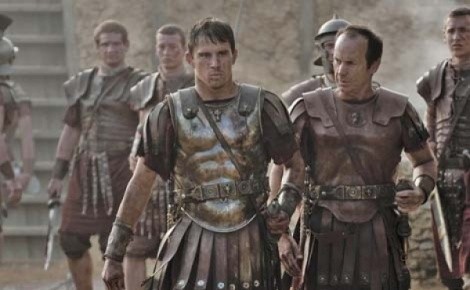
Film journalists may gripe about the general empty-headedness of movies, but there’s something even more aggravating about a movie that tries to say something despite having no idea exactly what that “something” is supposed to be. The Eagle is one of these true movie muddles: a period action yarn that may or may not be trying to instruct us about the murky moral quagmire of empire and occupation between beheadings.
The time is A.D. 140; the place is Roman-occupied Great Britain. Arriving for his new placement as commander of a frontier garrison is Marcus Flavius Aquila (Channing Tatum), a soldier’s son haunted by an infamous debacle in which his father and his men never returned from an expedition in the north of Britain, losing the golden eagle standard in the process. An injury in battle threatens to keep Marcus from his redemptive mission and stuck on the home front with his uncle (Donald Sutherland, almost visibly cashing his paycheck). But with the help of a native Briton slave, Esca (Jamie Bell), Marcus decides to undertake a likely suicide mission beyond Hadrian’s Wall into the untamed north to recover the eagle.
It may or may not surprise you to know that Esca’s own father was also a fighter, and that—coincidentally enough—there’s some tragic history between Esca’s papa and Marcus’. But Marcus was bold enough to entreat an easily swayed crowd to spare Esca’s life during a gladiatorial contest, so Esca has sworn allegiance to this Roman. That’s just how he rolls.
Thus, we have an apparently complex question of where our sympathy is expected to lie. Is it with Marcus, who is on a quest to restore an “honor” that is based on raping, pillaging and generally subduing the local populace? Or is it with Esca, who is devoting himself, out of a sense of personal loyalty, to the service of a man who represents the subjugation of his fellow countrymen? Because director Kevin Macdonald and screenwriter Jeremy Brock—who worked together on The Last King of Scotland—couldn’t possibly be wishy-washy enough to try to have it both ways, right?
Oh, but of course they could—and yet even then, they’re really not playing fair. While Esca gets a few speeches slamming the Romans for their brutal drive for hegemony, The Eagle certainly isn’t a tale like Braveheart that’s squarely on the side of the brave freedom-fighters taking on their occupying overlords. When we first get a glimpse of a full community of native Britons, it’s of the ferocious “Painted People,” whose coming-of-age rituals are shot in tilted angles emphasizing their primitive strangeness and who mostly play the role of nameless adversaries chasing down our heroes with dogs like Nazis in loincloths. Meanwhile, the long-lost Roman soldier (Mark Strong) who Marcus meets is a tragic figure haunted by the shame of his failed mission. Score one for turning the first global superpower into the underdog.
The ironic thing is, it was only last year that we had a movie in which a second-century Roman soldier is forced to confront the reality of relentless guerrilla action in the British Isles: Neil Marshall’s Centurion. That film was hardly a piercing geopolitical treatise in cinematic form, but it stripped down the story to a manageable size and was savvy enough not to be stingy about the sword-and-sandals mayhem. The Eagle plays as a simplistic adventure that keeps wanting to be taken seriously but never has the guts to stake out a point of view. Soldiers on both sides of a conflict can be respected for their bravery, says Marcus near the finale—except that one side may be crazy natives who slay their own children. Western Union could have delivered the message much more efficiently.
THE EAGLE
![]()
Channing Tatum, Jamie Bell, Donald Sutherland
Rated PG-13